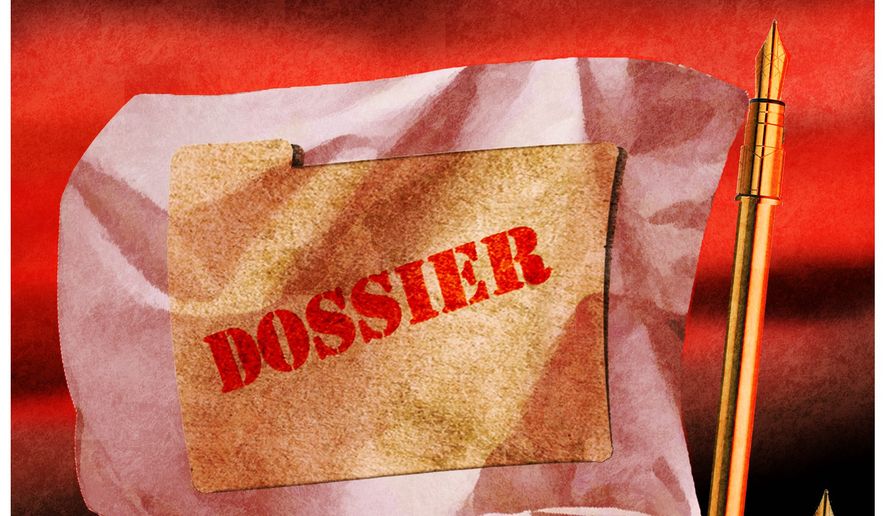OPINION:
The Washington Post recently published a surprising indictment of MSNBC host, Stanford graduate and Rhodes scholar Rachel Maddow.
Post media critic Erik Wemple wrote that Miss Maddow deliberately misled her audience by claiming the now-discredited Steele dossier was largely verifiable — even at a time when there was plenty of evidence that it was mostly bogus.
At the very time Miss Maddow was reassuring viewers that Christopher Steele was believable, populist talk-radio and the much-criticized Fox News Channel were insisting that most of Mr. Steele’s allegations simply could not be true. Miss Maddow was wrong. Her less-degreed critics proved to be right.
In 2018, the chairman of the House Intelligence Committee, Rep. Devin Nunes, California Republican, and the committee’s then-ranking minority member, Adam Schiff, California Democrat, each issued contrasting reports of the committee’s investigation into allegations of collusion between Russia and Donald Trump’s campaign team and the misbehavior of federal agencies.
Mr. Schiff’s memo was widely praised by the media. Nunes’ report was condemned as rank and partisan.
Many in the media went further. They contrasted Harvard law graduate Mr. Schiff with rural-central Californian Mr. Nunes to help explain why the clever Mr. Schiff got to the bottom of collusion and the “former dairy farmer” Mr. Nunes was “way over his head” and had “no idea what’s going on.”
Recently, the nonpartisan inspector general of the Department of Justice, Michael Horowitz, found widespread wrongdoing at the Department of Justice and the FBI. He confirmed the key findings in the Nunes memo about the Steele dossier and its pernicious role in the FISA application seeking a warrant against former Trump campaign adviser Carter Page.
In contrast, much of what the once-praised Mr. Schiff had claimed to be true was proven wrong by Mr. Horowitz — from Mr. Schiff’s insistence that the FBI verified the Steele dossier to his assertion that the Department of Justice did not rely chiefly on the dossier for its warrant application.
When special counsel Robert Mueller formed an investigatory team, he stocked it with young, progressive Washington insiders, many with blue-chip degrees and résumés.
The media swooned. Washington journalists became giddy over the prospect of a “dream team” of such “all-stars” who would demolish the supposedly far less impressively credentialed Trump legal team.
We were assured by a snobbish Vox that “Special counsel Robert Mueller’s legal team is full of pros. Trump’s team makes typos.”
Yet, after 22 months and $32 million worth of investigation, Mr. Mueller’s team found no Russian collusion and no evidence of actionable Trump obstruction during the investigation of that non-crime. All the constant media reports that “bombshell” Mueller team disclosures were imminent and that the “walls are closing in” on Mr. Trump proved false.
Mr. Mueller himself testified before Congress, only to appear befuddled and almost clueless at times about his own investigation. Many of his supposedly brightest all-stars, such as Lisa Page, Peter Strzok and Kevin Clinesmith, had to leave his dream team due to unethical behavior.
In contrast, Mr. Trump’s widely derided chief lawyers — 69-year-old Ty Cobb, 78-year-old John Dowd and 63-year-old radio and TV host Jay Sekulow — stayed out of the headlines. They advised Mr. Trump to cooperate with the Mueller team and systematically offered evidence and analyses to prove that Mr. Trump did not collude with the Russian to warp the 2016 election. In the end, Mr. Mueller’s “hunter-killer team” was forced to agree.
When the supposed clueless Mr. Trump was elected, a number of elites pronounced his economic plans to be absurd. We were told that Mr. Trump was bound to destroy the U.S. economy.
Former Princeton Professor and Nobel Prize winner Paul Krugman insisted that Mr. Trump would crash the stock market. He even suggested that stocks might never recover.
Former Treasury Secretary Larry Summers said Mr. Trump would bring on a recession within a year-and-a-half.
The former head of the National Economic Council, Steven Rattner, predicted a market crash of “historic proportions.”
In contrast, many of Mr. Trump’s economic advisers during his campaign and administration, including outsider Peter Navarro, pundit Steven Moore, former TV host Larry Kudlow and octogenarian Wilbur Ross, were caricatured.
Yet, three years later, in terms of the stock market, unemployment, energy production and workers’ wages, the economy has been doing superbly.
The point of these sharp contrasts is not that an Ivy League degree or a Washington reputation is of little value, or that prestigious prizes and honors account for nothing, or even that supposed experts are always unethical and silly.
Instead, one lesson is that conventional wisdom and groupthink tend to mislead, especially in the age of online echo chambers and often sheltered and blinkered elite lives.
We forget that knowledge can be found at all ages, and in all places. And ethics has nothing to do with degrees or pedigrees.
• Victor Davis Hanson, a classicist and historian at the Hoover Institution at Stanford University, is the author of “The Second World Wars: How the First Global Conflict Was Fought and Won” (Basic Books, 2017).




Please read our comment policy before commenting.